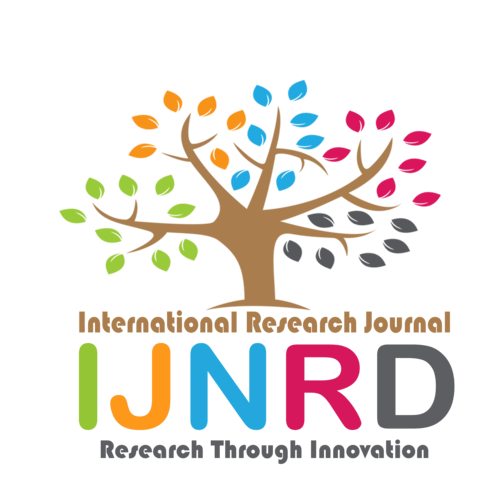|
|||||||||||||||

|
INTERNATIONAL JOURNAL OF NOVEL RESEARCH AND DEVELOPMENT International Peer Reviewed & Refereed Journals, Open Access Journal ISSN Approved Journal No: 2456-4184 | Impact factor: 8.76 | ESTD Year: 2016 Scholarly open access journals, Peer-reviewed, and Refereed Journals, Impact factor 8.76 (Calculate by google scholar and Semantic Scholar | AI-Powered Research Tool) , Multidisciplinary, Monthly, Indexing in all major database & Metadata, Citation Generator, Digital Object Identifier(DOI) |
||||||||||||||
Issue: May 2024
Volume 9 | Issue 5
Review Result and Publication of Paper within : 2-3 days
Click Here For more DetailsFor Authors
Forms / Download
Published Issue Details
Editorial Board
Other IMP Links
Facts & Figure
Impact Factor : 8.76
Issue per Year : 12
Volume Published : 9
Issue Published : 96
Article Submitted :
Article Published :
Total Authors :
Total Reviewer :
Total Countries :
Indexing Partner
Join RMS/Earn 300
Licence
This work is licensed under a Creative Commons Attribution-NonCommercial 4.0 International License







|
Published Paper Details
|
|
| Paper Title: | The Impact of Using Artificial Intelligence (AI) on Academic Administrative Task Efficiency in Private Educational Institutions in Sri Lanka |
| Authors Name: | MADUSANKA S T |
| Download E-Certificate: | Download |
| Author Reg. ID: |
IJNRD_209576
|
| Published Paper Id: | IJNRD2401131 |
| Published In: | Volume 9 Issue 1, January-2024 |
| DOI: | |
| Abstract: | Abstract-This research proposal sets out to explore how using Artificial Intelligence (AI) in the day-to-day tasks of academic departments in private schools in Sri Lanka affects things. The aim of the research is to understand what people directly involved in academic work think and feel about AI as a solution to increase the efficiency of daily tasks. To get these insights, I'll collect information from a carefully chosen group of people, including academic staff, non-academic staff, other interested parties, and other stakeholders who are working with the academic department. The samples from five major educational providers in the Colombo district will be selected using the purposive sampling method. To gather our data, I will use a multiple-choice questionnaire given to 100 participants in that sample group. Most responses might be from non-administrative staff (lecturers, tutors, and demonstrators) working in the academic department. After collecting the information from the questionnaire, the data would be statistically analyzed using SPSS and will be reviewed the answers question by question. This will help us see the coefficient and correlations of the variables and see the connections and patterns in the information we've gathered. Our study would also want to look beyond just the big picture of how AI impacts administrative tasks. We're also interested in the small details that might be easy to miss. As the outcome of this research, the ultimate goal would be to see the possibilities of using AI to help decision-makers, educators, and those who create policies make better decisions. We want to contribute to a smarter use of AI in how schools handle their daily tasks. This, in turn, can improve the overall quality and effectiveness of educational institutions in Sri Lanka. This study delves into how most private schools in Sri Lanka use study platforms like Moodle and Blackboard, but these tools might not suit the needs of local students, leading to practical challenges during implementation. Common problems are students tend to miss notifications, ignore important details of examinations, staff miss important deadlines, which will create a mess in the entire system. We aim to investigate how Artificial Intelligence (AI) can help bridge the gap between these study facilities and the daily routines of students and staff. AI is becoming more common in various industries, and schools are leading in adopting its capabilities. While AI has shown its potential in areas like healthcare and finance, it's also making strides in education, being used for personalized learning, automated grading, and predictive analytics to boost student performance. In a developing country like Sri Lanka, there's a growing need to explore new areas for development, and this study focuses on how AI can play a crucial role in education, information technology, and tourism. Through our research, we hope to shed light on how AI can enhance educational practices, making them more effective and relevant to the local context in Sri Lanka. In the ever-changing landscape of education, there's a growing focus on how Artificial Intelligence (AI) technology can improve administrative processes. This study zeroes in on independent educational institutions in Sri Lanka, exploring how AI can be used to make administrative functions more efficient. The use of AI in digital communication channels has already changed how information is shared. AI-driven chatbots De Andrade & Tumelero, 2022 & Livberber & Ayvaz, 2023, provide instant help to students and faculty, and technologies like natural language processing (NLP) enhance written communication. Administrative tasks in schools are often complex and have a big impact on how well the institution runs. The results of this research could give practical insights to independent educational institutions in Sri Lanka and add to our overall understanding of how AI plays a role in academic administration. This study might also help leaders make decisions about using AI to improve administrative efficiency. Ultimately, our findings could lead to better administrative practices and a more effective academic environment in private educational institutions, ultimately enhancing the quality of education in Sri Lanka. |
| Keywords: | Artificial Intelligence (AI), Academic staff, Private Educational Institutions, Administration, Task Efficiency |
| Cite Article: | "The Impact of Using Artificial Intelligence (AI) on Academic Administrative Task Efficiency in Private Educational Institutions in Sri Lanka ", International Journal of Novel Research and Development (www.ijnrd.org), ISSN:2456-4184, Vol.9, Issue 1, page no.b270-b281, January-2024, Available :http://www.ijnrd.org/papers/IJNRD2401131.pdf |
| Downloads: | 000118764 |
| ISSN: |
2456-4184 | IMPACT FACTOR: 8.76 Calculated By Google Scholar| ESTD YEAR: 2016 An International Scholarly Open Access Journal, Peer-Reviewed, Refereed Journal Impact Factor 8.76 Calculate by Google Scholar and Semantic Scholar | AI-Powered Research Tool, Multidisciplinary, Monthly, Multilanguage Journal Indexing in All Major Database & Metadata, Citation Generator |
| Publication Details: |
Published Paper ID:IJNRD2401131 Registration ID: 209576 Published In: Volume 9 Issue 1, January-2024 DOI (Digital Object Identifier): Page No: b270-b281 Country: Colombo 03, Western, Sri Lanka Research Area: Management Publisher : IJ Publication Published Paper URL : https://www.ijnrd.org/viewpaperforall?paper=IJNRD2401131 Published Paper PDF: https://www.ijnrd.org/papers/IJNRD2401131 |
| Share Article: | |
|
Click Here to Download This Article |
|
| Article Preview | |
|
|
|
Major Indexing from www.ijnrd.org
| Semantic Scholar | Microsaoft Academic | ORCID | Zenodo |
| Google Scholar | ResearcherID Thomson Reuters | Mendeley : reference manager | Academia.edu |
| arXiv.org : cornell university library | Research Gate | CiteSeerX | PUBLON |
| DRJI | SSRN | Scribd | DocStoc |
ISSN Details
 |
 |
ISSN: 2456-4184
Impact Factor: 8.76 and ISSN APPROVED
Journal Starting Year (ESTD) : 2016
DOI (A digital object identifier)
Conference
Open Access License Policy
Important Details
Social Media
| Copyright © 2024 - All Rights Reserved - IJNRD |












Facebook Twitter Instagram LinkedIn